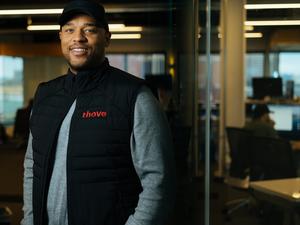
A Dublin startup has adopted the technology and investment structure of an acquisition and scaled back the size of its planned stock offering.
ReAlpha Tech Corp. is awaiting the SEC's approval for a direct listing, skipping an IPO. Then some current owners would offer for resale 4.1 million of its 42.5 million shares, according to an amended registration statement filed with the U.S. Securities and Exchange Commission.
That's down from 41 million that would have been registered for resale in the initial filing in April, which did not mean shareholders intended to sell.
ReAlpha also has restructured since that earlier filing to incorporate Rhove, the Columbus fintech it acquired in March – uniting their missions to help non-wealthy investors break into the commercial real estate market.
The company plans to acquire and sell fractional shares of short-term rental properties. It applied to trademark the term "vacation capitalist."
The company and its officers are in an SEC-required quiet period and not available for interviews, according to a spokesman. ReAlpha is one of Columbus Inno's Startups to Watch for 2023.
The offering is from current owners who are assumed to sell their stakes, based on information the company received, the prospectus said.
The sellers, not the company, would get the proceeds. However, ReAlpha could issue more shares once it's public.
The largest are Dublin developer Brent Crawford, an early ReAlpha investor who owns 5.6%, and Columbus VC firm Drive Capital, which owns 2.4%, through its earlier investment in Rhove. Other smaller owners registered for the resale, all holding less than 1%, include Silicon Valley Bank, NCT Ventures and Cleveland-based JumpStart Inc.
ReAlpha shares were $10 each in recent private transactions, according to the filing, which would value the company at $425 million and Crawford's stake at nearly $24 million of that.
The updated prospectus explains the pricing mechanism once the SEC declares the listing effective, since there is no traditional underwriter determining the price. Nasdaq algorithms will compute the price based on buy and sell orders and ReAlpha's advisory firm Maxim Partners LLC will give the ultimate go-ahead – or decide not to start trading if the price is too low.
A direct listing saves on transaction costs, such as hiring an investment bank to go public, according to an SEC explainer. (Maxim is compensated with 204,000 shares.) But it's a move usually made only by already extra large consumer brands that have sufficient capital.
The company also changed its future ticker symbol to AIRE from RHOM.
ReAlpha had net loss of $3.1 million for the year that ended April 30, 2022, another $3.1 million loss through the first nine months of the current fiscal year, and has $1.65 million of debt, the prospectus said. Rental income for now is minimal; the company owns five properties and sold off a group of Dallas properties on which it trained its software.
Once it's ready to start acquiring properties again, the company has a $200 million credit line. Also, a Luxembourg-based alternative investment group has committed investing as much as $100 million over three years if the company goes public.
ReAlpha now will use the technology and legal structure of Rhove to build that portfolio of short-term rentals. Rhove had solved the legal puzzle of creating a syndicate to open real estate investing to non-accredited investors.
"Rhove’s syndication platform enables us to offer a more seamless and efficient real estate investment experience to syndicate members," the prospectus said. "It will streamline the investment process and make the interface more user-friendly. Further, it will allow us to offer unique features such as the ability to earn rent rewards."
ReAlpha's first campaign for fractional ownership, a vacation home outside Orlando, shut down at the end of June and refunded all investors. Once public ReAlpha won't be able to use that particular crowdfunding mechanism again. That home will shift over to the Rhove platform and the new syndication model for any future campaigns.
ReAlpha has added another future potential revenue stream, the prospectus said. Next year it plans to offer its "ReAlpha Brain" – machine-learning software that identifies potential purchases – on a subscription basis to outside real estate investors.
Crawford also resigned from the company's board in April, and Christie Currie, the second employee to join the startup, resigned as chief marketing officer in May. Currie declined to comment. Messages were sent to representatives of the developer. The prospectus said the departures were not because of a dispute with ReAlpha.
ReAlpha has nine employees and an eight-person tech team in India.
Co-founder and CEO Giri Devanur, now also chairman, owns 65% of the company.
A serial entrepreneur who took his last company public, Devanur founded ReAlpha in late 2020 with a Texas real estate developer, who remains a director but left operations.
ReAlpha has a $200 million line of credit available when it is ready to invest in properties. An earlier version of this story misstated the amount.






